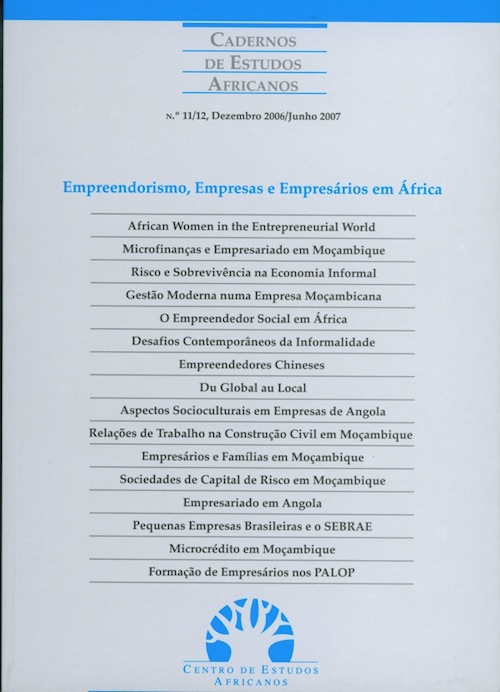Chinese Entrepreneurs and the Process of Economic Transformation in China
DOI:
https://doi.org/10.4000/cea.941Keywords:
Empreendedorismo, Sector privado, Desenvolvimento económico, República Popular da ChinaAbstract
Through the analysis of the reforms conducted by the Chinese Communist Party and of the entrepreneurship process in China, we seek to demonstrate the interactions between the institutional framework and the private initiative. In the Popular Republic of China, the institutions that regulate the functioning of society are not originally legal regulations or cultural conventions but instead instructions emanated from the CPP. These also comprise the essential regarding entrepreneurial activities’ regulations. In order to do this, we primarily identify the specific characteristics of the Chinese institutional background to be able to afterwards situate the private initiative conditions in historical terms and investigate the interactions of the entrepreneurs with this institutional environment.
References
Burt, R. S. (1992), Structural Holes: The Social Structure of Competition, Cambridge, Harvard University Press.
Cheung, Peter T.Y., Jae Ho Chung, e Zhimin Lin (1998), Provincial Strategies of Economic Reform in Post‑Mao China: Leadership, politics and implementation, Nova Iorque, M. E. Sharpe.
China Statistical Yearbook (1993), Beijing, State Statistical Bureau of PRC.
China Statistical Yearbook (2001), Beijing, National Bureau of Statistics of China. Fan Gang, 1998, «Is the transition under control? Gradualism and macroeconomic policy», Michel Fouquin e Françoise Lemoine (eds.), The Chinese Economy, Londres, Economica.
Gardner, John (1982), Chinese Politics and the Succession to Mao, Nova Iorque, Holmes & Meier.
Gregory, N., Tenev, S., e Wagle, D. (2000), «China’s emerging private enterprises: prospects for the new century», Washington, D.C., International Finance Corporation.
Gregory, P. R., e Stuart, R. C. (1992), Soviet Economic Structure and Performance, Boston, Houghton Miflin Company.
Huang, Ray (1990), China: a Macrohistory, Nova Iorque, M. E. Sharpe. Kissinger, Henry (1994), Diplomacy, Nova Iorque, Touchstone.
Kraus, Willy (1991), Private Business in China: Revival between Ideology and Pragmatism, Honolulu, University of Hawaii Press.
Laaksonen, Oiva (1988), «Management in China during and aTer Mao», Berlim, Walter de Gruyter & Co.
Liu Hua Wei (2000), Legal Guide to Foreign Investment in China, Foreign Investment Counsel Series, Chinese Economics Publishing House.
Ma Jisen (1988), «A General Survey of the Resurgence of the Private Sector of China’s Economy», Social Sciences in China, Autumn, pp. 78‑92.
Mao Tsetung (1975), Obras Escolhidas de Mao Tsetung, Tomo IV, Pequim, Edições em Línguas Estrangeiras.
Naughton, Barry (1994), Growing out of the Plan: Chinese Economic Reform, 1978‑1993, Nova Iorque, Cambridge University Press.
Studwell, Joe (2002), The China Dream: The Elusive Quest for the Greatest Untapped Market on Earth, Londres, Profile Books.
Trigo, Virgínia (1995), The Upsurge of Private Entrepreneurship in China, Hüvl Editions.
Wong, Christine P. W. (1996), «People’s Republic of China», Pradumna B. Rana e Naved Amid (eds.) From Centrally Planned to Market Economies: The Asian Approach, vol. 2, Oxford, Oxford University Press, pp. 3‑275.
Young, Susan (1995), Private Business and Economic Reform in China, Nova Iorque, M. E. Sharpe.
Downloads
Published
Issue
Section
License
Copyright (c) 2016 Cadernos de Estudos Africanos

This work is licensed under a Creative Commons Attribution-NonCommercial-ShareAlike 4.0 International License.
I authorize the publication of the submitted article/review of which I am the author.
I also declare that this article is original, that it has not been published in any other way, and that I exclusively assign the publication rights to the journal Cadernos de Estudos Africanos. Reproduction of the article, in whole or in part, in other publications or on other media is subject to the prior authorization of the publisher Centro de Estudos Internacionais do Iscte - Instituto Universitário de Lisboa.

